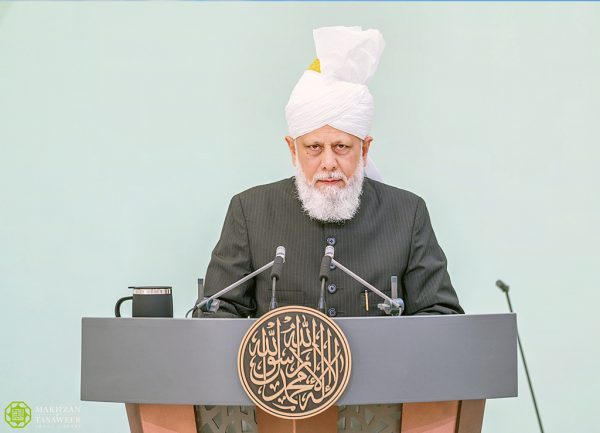Summary preapred by The Review of Religions
After reciting Tashahhud, Ta‘awwuz and Surah al-Fatihah, His Holiness Hazrat Mirza Masroor Ahmad (aba) said that he would continue narrating incidents from the battles that took place during the Battle of Tabuk.

His Holiness (aba) said that on this occasion, women also offered whatever sacrifices they could. They offered financial sacrifices by presenting their jewellery to the Holy Prophet (sa). However, that was not all. All Muslims were extremely concerned with protecting the Holy Prophet (sa) from any sort of harm, including the women. Hence, they urged their men to go alongside the Holy Prophet (sa) for this battle. One companion who had gone out for some task returned home when the Holy Prophet (sa) was departing Madinah with his army. This companion was returning home after being away for some time and was eager to see his wife. As he approached his home, he saw his wife sitting in the courtyard. When he went near her to greet her, she pushed him away. Confused, he asked why she was treating him this way when they were seeing each other after a long period. She replied, saying that how could he think of showing affection at a time when the Holy Prophet (sa) was facing grave danger? She said that he should first go and fulfil his duty and then worry about any displays of affection. Hence, the companion immediately mounted his riding animal and joined the Muslim army.
Areas Visited Along the Way to Tabuk
His Holiness (aba) said that according to narrations, after approximately 15 to 22 stops along the way, the Holy Prophet (sa) arrived at Tabuk. Later, mosques were established at the various places where the Holy Prophet (sa) stopped along the way to Tabuk. These places include Dhu Khushub, Faifa, Dhu al-Marwah, Ruqqah, Wadi al-Qurrah, Sa’id, Hijr, Sadr Haudah, Dhu al-Jifah, Shiqq Tarah, Al-Batrah, Ala, Dhat al-Khitmi, Akhdar, Dhat al-Zira, Thaniah al-Diran, and Tabuk.
His Holiness (aba) said that once, along the way, it is recorded that the Holy Prophet (sa) fell asleep at night and awoke the next morning when the sun had started to rise. The Holy Prophet (sa) reminded Bilal (ra) that he had told him to wake him up for the morning prayer. Bilal (ra) replied that he too had been overtaken by sleep. The Holy Prophet (sa) then ordered the army to set out, and after some distance, stopped to offer the morning prayer, and then continued his journey until reaching Tabuk the next day.
Advice of the Holy Prophet (sa) Arrival at Tabuk
His Holiness (aba) said that upon reaching Tabuk, the Holy Prophet (sa) addressed the Muslims saying that the Book of God was the greatest truth, and that the righteous word was the most firm. He said that the best religion was that of Abraham (as), the best practice was the practice of Muhammad (sa), the loftiest word is the remembrance of Allah, and the Holy Qur’an is the best exhortation, and the best matters are those done with firm conviction, while the worst are innovations. The best guidance is that of prophets, and the best death is martyrdom. The best actions are beneficial; the best guidance is that which is followed. The worst blindness is blindness of the heart. Then, the Holy Prophet (sa) said that the upper hand is better than the lower hand, a lesser amount that suffices is better than a greater amount that leads one to ignorance, the worst repentance is that which is done right before death, and the greatest embarrassment will be on the Day of Judgement. The Holy Prophet (sa) said that some people would be late to offer the Friday prayer, and others would be sparse in the remembrance of Allah. He said that among the greatest sins is lying, and the greatest wealth is the wealth of heart, the greatest provision is righteousness, the greatest intelligence is fear of Allah, the best word is that which establishes certainty in the hearts; to doubt is disbelief, to wail is ignorance, dishonesty is the fire of hell, distasteful poetry is from Satan, and alcohol was the drink of sin. The Holy Prophet (sa) went on to give guidance to the Muslims on various other matters.
His Holiness (aba) said that the Holy Prophet (sa) also rendered guidance at various instances during the journey to Tabuk. Once, the Holy Prophet (sa) said that the best of people were those who mounted their animals or set out by foot for the service of Allah, while the worst are those who recite the Book of God but do not abandon their ignorance and act upon it.
Letters of the Holy Prophet (sa) to Leaders & Peace Treaties with Various Tribes
His Holiness (aba) said that it is recorded that once the Holy Prophet (sa) arrived in Tabuk, he sent a letter to Roman Emperor Heraclius, who was in Homs. When Heraclius read the letter, he instructed the messenger to return and inform the Holy Prophet (sa) that he accepted him; however, he could not abandon his empire and even sent some money. When the Holy Prophet (sa) was informed of this response, he said that Heraclius had not told the truth. It is recorded that two letters were sent to the Chosroses; one urging him not to stop his people from accepting Islam, and the second sent later, inviting him to accept Islam.
His Holiness (aba) said that when the Holy Prophet (sa) reached Tabuk, the leaders in the surrounding areas became fearful, and those who were once plotting against the Holy Prophet (sa) now feared their own survival. They presented themselves before the Holy Prophet (sa), requesting treaties of peace. For example, the leader of Aila, an area near Tabuk, requested a peace treaty from the Holy Prophet (sa), and accordingly, the Holy Prophet (sa) instructed that a treaty be drafted to ensure the safety of the people of Aila and the surrounding areas. A peace treaty was also formed with the people of Maknah, who were predominantly Jewish. Then, treaties were formed with the Jarwah and Azruh, which were located near Tabuk, ensuring their safety and protection.
The Expedition of Hazrat Khalid bin Walid (ra) Towards Uqaidar bin Abdil Malik
His Holiness (aba) said that in relation to the Battle of Tabuk, there is also mention of an expedition which was of Hazrat Khalid bin Walid (ra) towards Uqaidar bin Abdil Malik. The Holy Prophet (sa) sent Hazrat Khalid (ra) in Rajab 9 AH with 420 men towards Daumah al-Jandal, which was a fortress and town between Syria and Madinah and 400 kilometres away from Tabuk. Uqaidar was the leader of the Banu Qindah and was a Christian. God had informed the Holy Prophet (sa) that he would be grazing his animals at night, and that is when the Muslims should capture him and bring him to the Holy Prophet (sa). Hence, as Khalid bin Walid (ra) approached the fortress, he saw Uqiadar outside just as the Holy Prophet (sa) had said he would be. The Muslim army approached and captured Uqaidar, while Uqaidar’s brother fought back and was ultimately killed. Hazrat Khalid (ra) offered Uqaidar peace and protection by taking him to the Holy Prophet (sa), provided he would ensure Muslim victory over Daumah al-Jandal, to which Uqaidar agreed. With the assurance of a peace treaty, Uqiadar agreed to open the doors of the fortress for Hazrat Khalid (ra). In this expedition, the Muslims obtained 2,000 camels, 800 captives, 400 chainmail and 400 spears.
His Holiness (aba) said that Uqaidar was presented before the Holy Prophet (sa) while he wore a cross and silk clothing. Upon seeing the Holy Prophet (sa), he bowed before him, but the Holy Prophet (sa) instructed him not to do so. Uqaidar was freed, and the Holy Prophet (sa) established a peace treaty with him, which also mentioned that Uqaidar had accepted Islam.
His Holiness (aba) said that during Tabuk, it is recorded that a companion passed away and was buried in Tabuk. Other companions wished that they too could have been buried in Tabuk in the manner that this companion was. A companion narrates that he saw the Holy Prophet (sa), Hazrat Abu Bakr (ra) and Hazrat Umar (ra) digging the grave of a companion who had passed away. The Holy Prophet (sa) had gone down into the grave, while Hazrat Abu Bakr (ra) and Hazrat Umar (ra) passed the deceased body to him.
His Holiness (aba) said that whilst in Tabuk, the Angel Gabriel came to the Holy Prophet (sa) and informed him that another companion, Mu’awiyyah Muzani (ra), had passed away in Madinah and said that the Holy Prophet (sa) should offer his funeral prayer. In a state of vision, the Holy Prophet (sa) was shown Mu’awiyyah Muzani lying on a cot that was being raised, and he saw ranks of angels as he offered the funeral prayer. The Holy Prophet (sa) asked how this companion had attained this rank. Gabriel replied that it was due to his love for Surah al-Ikhlas, chapter 112 of the Holy Qur’an.
His Holiness (aba) said it is recorded that when in Tabuk, the Holy Prophet (sa) consulted with the companions about advancing further. The companions replied that if the Holy Prophet (sa) had been instructed by God to advance, then they would join him. The Holy Prophet (sa) said that had he been instructed by God, then he would not have consulted with them in the matter. Hazrat Umar (ra) suggested that the Romans had vast armies, and just the Holy Prophet’s (sa) presence in Tabuk had frightened them, and that they should go back until the next year, and in the meantime, make further plans. It is recorded that the Holy Prophet (sa) agreed to return to Madinah and set out after remaining in Tabuk for 20 days. It is recorded that the Holy Prophet (sa) spent a total of two months away from Madinah.
His Holiness (aba) said that he would continue mentioning details of the Holy Prophet’s (sa) return to Madinah in the future.
Prayers for Peace in the World
His Holiness (aba) once again urged prayers for the Ahmadis in Bangladesh, where clerics and opponents of Ahmadiyyat have been creating problems. His Holiness (aba) prayed that may Allah protect all Ahmadis against the evil of these clerics and opponents.
His Holiness (aba) also urged prayers for the Ahmadis of Pakistan; may Allah protect them. There is a great need for prayers. Ahmadis must focus a great deal on prayers.
His Holiness (aba) also urged prayers for the Palestinians who are being killed despite agreements for a ceasefire. May Allah have mercy.
His Holiness (aba) also urged prayers for Africa, where in some countries governments are inflicting injustices, while in others terrorists are inflicting harm which then also impacts Ahmadis.
His Holiness (aba) prayed that may Allah establish peace and security throughout the world.
His Holiness (aba) said that he would lead the funeral prayer in absentia of the following deceased member:
Funeral Prayer
Muhammad Hussain, son of Muhammad Ismail of Rabwah, Pakistan. He is survived by his wife, three daughters and four sons. One of his sons, Muhammad Umran, is a missionary in Niger and was unable to attend his father’s funeral due to being in the field of service. Another one of his sons, Muhammad Luqman, is also a life devotee. Muhammad Hussain was regular in keeping fasts and offering prayers and possessed many virtuous qualities. He was at the forefront of offering financial sacrifices. His Holiness (aba) prayed that may Allah grant forgiveness and mercy, elevate his station, and grant patience to his family, especially his son, who was unable to attend the funeral.



Add Comment